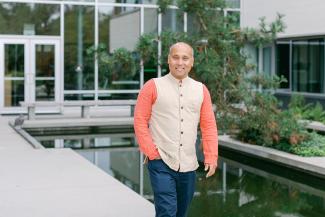
Supriya Routh is a leading labour and employment law researcher, whose work straddles the disciplines of law, political philosophy and sociology. We’re delighted to welcome him to the Allard School of Law as an associate professor.
Students will have their first chance to study with Professor Routh this spring, when he teaches the law school’s upper-level seminar on Justice, Diversity and Legal Legitimacy and term two of first-year Contracts.
Prior to joining Allard Law, Professor Routh was an associate professor in the Faculty of Law at the University of Victoria, where he also held an appointment as an associate at the Centre for Asia-Pacific Initiatives. Before moving to Canada, he was an assistant professor at the West Bengal National University of Juridical Sciences in India.
In this Q&A, Professor Routh shares a bit about his research on sustainable livelihoods and the regulation of informal and atypical work — and why he’s excited about his new role at Allard Law.
What are your research interests?
My research focuses on the role of formal and informal legal regulation in promoting better opportunities for workers to earn a livelihood, under fair conditions. In particular, I’m looking at why a range of livelihood activities are excluded from the traditional account of labour and employment law, and am interested in developing a social justice-inspired “public” rationale for the regulation of work — one that takes human diversity seriously. This is critical, since it is non-industrialized, informal and atypical work that constitutes the majority of working arrangements in the Global South and supports the supply chains of the North.
A general focus on economic development does not translate per se into a concern about individual human beings and their needs and aspirations.
A second trajectory of my research explores the idea of legal legitimacy when there are competing sources of social and political authority. I ask, what are the characteristics that can help determine legal legitimacy? This research will offer conceptual tools for normative decision-making involving sustainable development in cases where competing concerns of development (including livelihood activities) and environmental protection are at play.
Tell us about your current research projects.
My current research looks at the intersection of labour regulation and environmental protection, with the goal of better understanding the role of regulation in promoting fulfilling livelihood opportunities — without burdening non-human nature. I am working with the Pehdzeh Ki First Nation to gain a better understanding of their decision-making processes for economic and infrastructural developmental projects and the practical and cultural rationale for sustainable development. Understanding the normative rationale from the Pehdzeh Ki First Nation perspective also helps centralize non-Eurocentric and postcolonial worldviews in the debate on the sustainability of livelihoods and environmental protection.
Whether it is around mining, global supply chains, or deliberative democracy, the Allard community is at the forefront of some of the most important debates of our times.
When we discuss sustainability, our preoccupation seems to be environmental sustainability and sustainable economic development. But a general focus on economic development does not translate per se into a concern about individual human beings and their needs and aspirations. So, my research focuses on how legal regulation can support fulfilling livelihood activities that are also environmentally sustainable.
In a second project, I’m focusing on the recent sweeping labour law reforms in India, which have challenged the historical constitutional narrative on labour in that country. I am analyzing these reforms using a social justice lens, which provides a broader view of labour in its overall social significance. In this approach, regulation of labour is understood as a more fundamental constitutional norm instead of individual or collective contracts between employers and employees.
What do you look forward to most about being part of the Allard community?
I find Allard Law’s approach to bridging local challenges with global debates most appealing. Whether it is around mining, global supply chains, or deliberative democracy, the Allard community is at the forefront of some of the most important debates of our times. I very much look forward to becoming a part of such a vibrant intellectual community and engaging in collective reflections and deliberations.
I know several Allard colleagues through their work and have personally met some of them, and look forward to meeting other colleagues. I also eagerly await meeting students at Allard. I expect to closely interact with JD and graduate students from diverse backgrounds, who often raise the most fundamental questions on many of the important challenges we collectively face.


